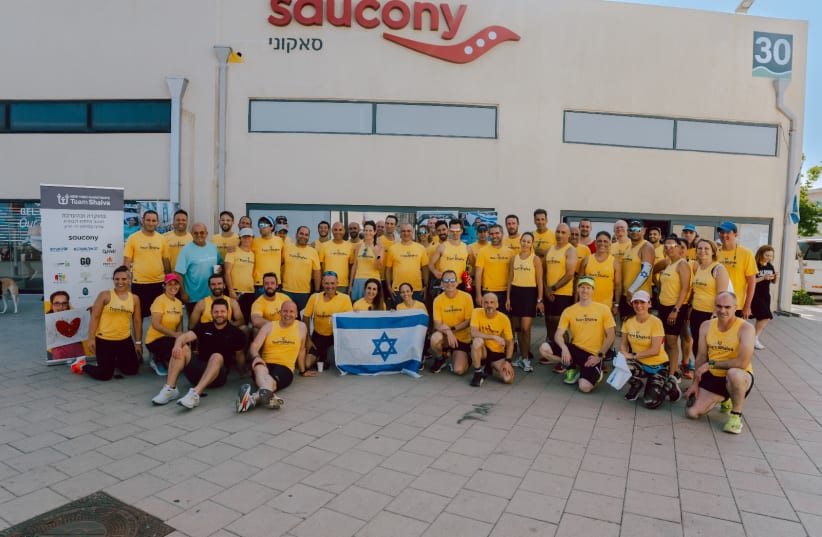After serving 150 days in the reserves with the Israeli Defense Forces, running has taken on a raw, urgent meaning for me. I haven’t just run toward Hamas terrorists to protect and defend the Israeli people. I haven’t just sprinted to safe rooms when sirens blared, warning of missiles from Hamas, Hezbollah, or Iran overhead. I’ve been running from my own memories, my nightmares, and my October 7 PTSD. Now, I run because it’s the only thing that keeps me sane in a world that has turned upside down.
Let me be clear: running saved my life. Not in the poetic sense, but literally. In a post-October 7 world, running has taken on a new dimension.
It’s my outlet, my rebellion against everything and anyone trying to dehumanize me. Every step I take is defiance—a way to remind myself that I’m still here, still fighting, still human – and filled with hope.
This Sunday, I’ll lead a group of 260 Israeli runners—a record number—through the streets of New York City in the marathon. We’re not just running for personal glory in this famed event; we’re running as part of Team Shalva, raising money for Shalva—a nonprofit that supports people with disabilities in Israel and around the world. Our goal as an organization has always been to provide a sense of normalcy for individuals and families who, at baseline, face more challenges than the average person. In today’s Israel, normal no longer exists.
October 7 shattered any illusion of normal life in Israel, leaving us in a constant state of emergency. For us, it was our 9/11. But here’s what the world doesn’t seem to understand: we’re not victims. We’re survivors, and our resilience and hope are our greatest weapons. The New York Marathon is more than a race—it’s a statement. For many of us, including the 260 runners on that starting line, running is what gets us out of bed in the morning. It’s how we cope with the unbearable weight of loss, grief, and fury.

One runner in our group is a father who lost his son, Reef, to a Hamas attack. Reef, an IDF soldier, was killed just hours after telling his friend how proud he was that his dad would be running the marathon. Now, his father runs with a shattered heart. Every mile he covers is a tribute to his son—a son stolen from him by terrorists. He runs to keep Reef’s memory alive. To remind the world: we don’t forget.
Another of our runners will be running side by side with the doctor who saved his life after a drive-by shooting terror attack a year ago. Together, they are a walking, running symbol of everything Israel stands for—resilience, unity, and the refusal to be broken. They will cross the finish line not as victims, but as a living, breathing testament to what happens when we use our resources to save lives, rather than to kill or kidnap.
They didn't break us
And then there’s the runner who saved his entire kibbutz from terrorists who infiltrated his community on October 7. He typically runs every morning as a way of centering himself—but on October 7, he didn’t run. Something told him to stay. His decision ultimately saved dozens of lives, as he and the other security members of his kibbutz fought off every Hamas terrorist who broke into their homes that day. When he crosses that finish line in New York, he’ll be sending a message loud and clear: “You didn’t break me. I’m still here.”
For all of us, running isn’t just exercise. It’s therapy. It's survival. People suffering from PTSD often turn to running as a way to cope with their trauma. Why? Because running is primal. It’s a battle with yourself, with your pain, with the memories that refuse to fade. The rhythmic pounding of your feet against pavement, the sharpness of your breath—it forces you to be present, to confront the chaos in your head.
In Israel, we’re always running—from rocket fire, from air raid sirens, from the latest tragedy. But running gives us back something our enemies would love to take: hope. With every mile, we reclaim our bodies, our minds, our lives.
Right now, as I write this, I’m stationed in the North. Hezbollah has been firing at Israel since October 8, and every day, we face the uncertainty of what will come next. This is our reality. The marathon is a brief moment of escape, a rare chance to feel something like normal again. But don’t misunderstand: for us, this race is also a battlefield, just a different kind.
When we run, it’s not just for ourselves—it’s for the 101 hostages still in Gaza, for the soldiers fighting for a better future, for the 1,200 lives lost on October 7 and the hundreds more since, for the children who will never know a world without conflict, and for all the individuals and families living with disabilities. Every step is a reminder to the world that we’re still here, and we’re not backing down. Just as those who lived through 9/11 can relate, every stride we take in New York will be a declaration: we are not your victims, and we will not be erased.
The writer is the Deputy Director of Shalva National Center and Leader of Team Shalva’s New York City Marathon Delegation
